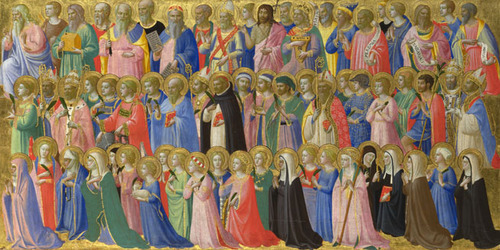 HOMILY for the 21st Sat per annum (II)
HOMILY for the 21st Sat per annum (II)
1 Cor 1:26-31; Ps 32; Matt 25:14-30
It is prevalent in classical Protestant thought to see salvation as a kind of amnesty won by Christ’s grace so that God overlooks our human sinfulness and sees only the goodness of Christ. We’re entirely passive, then, in the work of our salvation. But Catholic theology teaches otherwise. As today’s Gospel suggests, God wants us to be actively involved in our redemption and sanctification, so that we can say it’s not just Christ’s righteousness that covers us over, but it’s “our righteousness, and sanctification and redemption”; our holiness is always with Christ and never apart from him, but also, never without our own selves so that it is truly ours.
So, today’s Gospel parable illustrates that God has entrusted to us precious gifts, his grace, as a kind of investment. He makes this investment in the first place because we have been justified by Christ, that is, placed in a position of friendship with God so that he can once more entrust us with his grace. But God’s gift of grace is given to us to be actually used by us for our benefit, to stretch us and help us grow as adopted children of God, and, so, “enter into the joy of [our] master”.
So, the Christian life of grace is about learning to co-operate with God’s grace, working alongside God and really practicing the virtues, especially learning to love as Jesus loves. Thus we become remade in the image and likeness of Christ, taking on his beauty and goodness. Hence, as St Paul says, our life – the Christian life of grace – is “in Christ Jesus”. Since God is the source of this new life in Christ, similarly, perhaps, to how any profits from an investment are only possible because we were given the capital sum in the first place, so, we attribute all our goodness and virtue to God, to his initial and on-going ‘investment’ of grace in us. Thus St Paul rightly says: “Let him who boasts, boast of the Lord”. But, at the same time, we recognize that it’s not just God acting alone but we’re involved too, making prudent investments, just as grace works in us and with us to redeem and sanctify us.
For God’s grace does not destroy or replace or cover up our human nature; it does not force us into some ready-made, ‘one size fits all’, mold of holiness; God doesn’t force us to love. Rather grace builds on human nature if we are open to it, perfecting you and me, with our own particularity and capacities. So, we hear in the Gospel that “he gave… talents… to each according to his ability”. Hence, we see such diversity among the saints, but at the same time, they are united by their heroic love for God and their neighbour, for their particular virtues, their ‘profits’ stem from the one gift of Love, God’s ‘investment’ of grace itself.
God’s grace interacts with our human nature in this way, causing us to co-operate with Love because God doesn’t want us to be his sons and daughters in name only; he wants us to actually be his children. Our heavenly Father wants us to be personally transformed so that we freely choose to love, and, so, become more like him. We can choose this, and attain to such divine heights only because God works alongside us. His Spirit of Love is poured into our hearts to transform us, to move us towards God, to strengthen us in our free choices for the good and the true, to bring our good acts to completion, and thus, to make us holy. Hence, God is the first cause of our holiness, but we, in co-operating with grace, are secondary causes of our own holiness too. As St Thomas says: “The love of God infuses and creates goodness” in us. Hence, the Catholic view of justification taught by the Council of Trent is that “justification is not merely the remission of sins, but it is also the sanctification and renovation of the inner man”. For through grace, you and I, can actually and actively become saints.
stephendagostino liked this
lawrenceop posted this